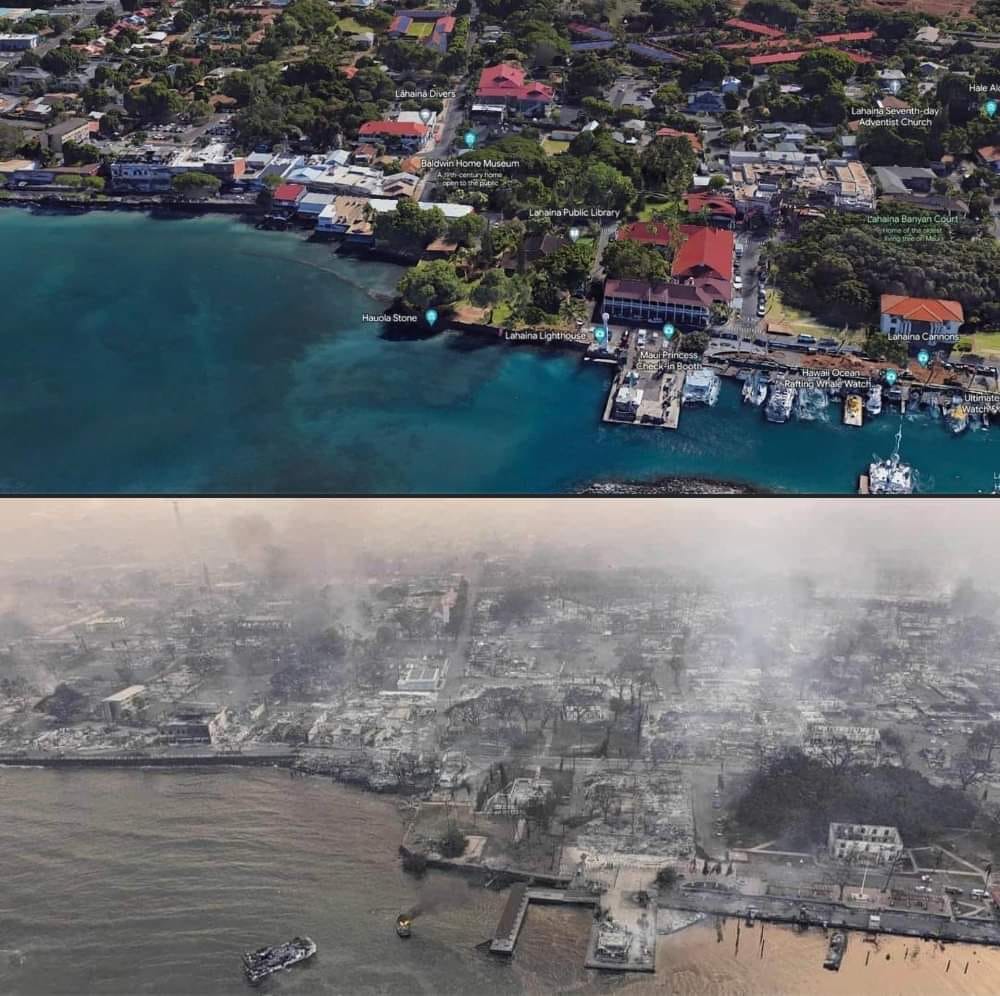A Similar Fate May Be Coming to a Town Near You!
I have fond memories of Lahaina. I first visited the town in 1976 when I was First Officer on Greenpeace VII. We were warmly received and the people of Lahaina generously supported us. It was a pretty town with a thousand-year history including once being the capital for King Kamehameha I of Hawaii. It also had a more sordid history as a whaling town.
Since 1976, I have spent considerable time in the Islands, on Maui, Oahu, and especially Molokai. And I have witnessed the diminishing life on land and in the sea on and around islands that have seen the largest extinction of species events on the planet.
Invasive species like pigs, chickens, rats, and mosquitos and of course the most invasive species of all – humans have weakened the Hawaiian ecosystems and this has contributed to the situation today where climate change has now heralded this destruction as a harbinger of worst things to come.
A combination of drought, dried grasses and high winds ignited this holocaust of fiery destruction.
The Anthropocene has unleashed the age of the pyrocene and places that we once considered safe from wildfires, floods and storms are now becoming vulnerable to unnatural disasters.
Hawaii is known as the extinction capital of the world. 95 of 147 species of birds have been driven to extinction since the arrival of people in the islands. This is not ancient history. The last known wild Hawaiian crow was classified as extinct by the IUCN as recently as 2002.
Eco-systems are protected by the diversity of species within them and diversity in Hawaii has been devastated and with the decline of diversity comes the decline in interdependence. The decline in both diversity and interdependence results in ecological collapse.
Worldwide we will see more increases in wildfires, forest fires, floods, mudslides and storms. Where I live in Vermont has been relatively safe until recent flooding but a greater threat to Vermont than flooding will be forest fires.
The consequences of not addressing climate change are emerging on so many levels everywhere on the planet and will increase more destructively with every year that we continue to do nothing.
We see the problem and we do nothing to solve it.
We all want change but we don’t want to change.
The more we deny, the more we will suffer.
At least 55 people died in the Lahaina fires. I am quite sure that each of them awoke in the morning and the last thing on their mind on the day they died was that they would die in the searing flames along with their town.
The death toll on Maui is expected to rise significantly
How many more of us will awake to unexpectedly die by the end of the day, drowned in flood waters or burned in wildfires?
Others will die slowly from thirst and starvation as climate change and species extinction wipe out crops and ecosystems.
Recently 7 people died and 20 were injured in some 80 fires that raged through Greece.
40 people have died in wildfires that recently swept through Algeria, Italy and Portugal.
Australia, California and so many other places have experienced death and destruction as world temperatures have increased and weather patterns have changed dramatically.
All the money in all the banks in the world will not save us. Politicians will certainly not save us.
It is an impossible problem and the only answer to an impossible problem is to find the impossible solution and that can only be accomplished by harnessing the power of individual passion, courage, determination and imagination.
It is a difficult task made even more difficult by recent actions by governments to heavily police and penalize climate activists.
The message from the government is to endure, not ask why, and die.
The laws being passed are sending the message that resistance is futile. This is a message we cannot accept and if the consequences are fines and imprisonment, so be it. Incarceration and monetary punishment are
preferable to being drowned, starved, or burnt alive.







